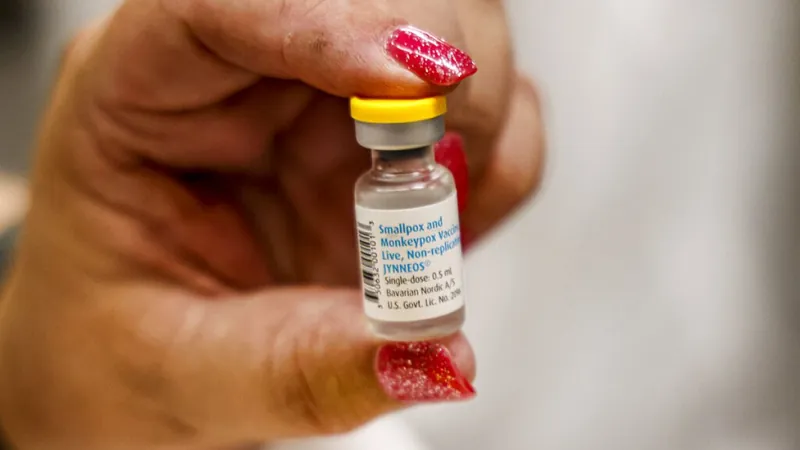
Warning: Mpox Vaccine Immunity May Diminish Within a Year! What You Need to Know Now
2024-10-03
Author: Nur
Recent Research Findings
Recent research has unveiled a potentially alarming reality regarding immunity from the mpox vaccine, suggesting that its effectiveness may decrease significantly after just one year. A study conducted by Harvard Medical School, involving 45 participants who had either been vaccinated or infected with mpox during the global outbreak in 2022, indicates that antibody levels begin to drop off notably between six to twelve months following immunization.
Vaccine Regimen and Immunity
Health authorities recommend a two-dose regimen, administered four weeks apart, which initially provides better immunity than a single dose. However, strikingly, data reveals that a year post-vaccination, the immune response of individuals who received two shots was comparable to the peak antibody response observed in those who had only one dose—suggesting limited ongoing protection.
Need for Booster Shots
Experts are urging that individuals vaccinated during last year's outbreak may require booster shots to sustain their immunity. “This study suggests that boosters might be required to maintain vaccine effectiveness,” said Jonas Albarnaz, a virulence researcher at the UK-based Pirbright Institute.
European Health Authorities Respond
In Europe, health authorities are already heeding the warning: France has begun recommending booster shots for individuals at heightened risk of infection, including gay and bisexual men, sex workers, and transgender individuals with multiple sexual partners.
Study Significance
The study, published in the distinguished medical journal JAMA, focused specifically on the Modified Vaccinia Ankara-Bavarian Nordic (MVA-BN) vaccine, the only mpox vaccine approved in the European Union and the UK.
Understanding Immunity Levels
It's important to note that a decrease in antibody levels doesn’t necessarily equate to a loss of protection against mpox, according to Jake Dunning, a senior research fellow at the University of Oxford. He emphasizes that even with reduced antibodies, the vaccine may have effectively primed the immune system to recognize and counter the virus swiftly if encountered again.
Need for Larger Studies
To fully gauge the public's immunity against mpox, larger studies involving diverse populations—such as children, pregnant women, and individuals with HIV—are imperative. Understanding the overall immunity landscape is critical for assessing current outbreak risks, says Alexis Robert from the London School of Hygiene and Tropical Medicine.
Global Efforts in Control
Following a concerted effort in 2022, global outbreaks of mpox were brought under control through effective public health strategies and accessibility to vaccines and treatments. Almost 337,000 mpox vaccines were administered across 25 European nations from September 2022 to February 2023, and infections have remained low since then.
Current Situation in North America and Africa
Dr. Boghuma Titanji from Emory University expressed reassurance that, nearly two years after the outbreak reached its peak in North America and Europe, case numbers have remained low and instances of post-vaccine infections are rare. However, the emergence of a new mpox strain in the Democratic Republic of the Congo (DRC) last year has raised red flags for health experts, as cases have been on the rise across Africa. More than 26,500 mpox cases and 720 deaths have been reported in Africa this year alone, prompting the World Health Organization (WHO) to declare an international health emergency in August.
Transmission and Treatment
Mpox spreads through close contact, including sexual interactions with an infected individual, with symptoms ranging from skin lesions and fever to swollen lymph nodes. While one antiviral treatment is available in Europe, access to vaccines and treatments remains inadequate across much of Africa.
Research Update on Antiviral Drug
In a troubling turn of events, an experimental antiviral drug tested this summer failed to show improvement in symptoms for patients infected with the predominating strain in DRC. Given the current landscape, Albarnaz emphasized that this new vaccine study acts as a 'disappointing' reminder for the urgent need to bolster efforts in developing preventive measures against mpox.
Conclusion and Call to Action
As health officials evaluate rising cases and waning vaccine immunity, now is the time to stay informed and proactive in understanding your own mpox protection strategy!




 Brasil (PT)
Brasil (PT)
 Canada (EN)
Canada (EN)
 Chile (ES)
Chile (ES)
 España (ES)
España (ES)
 France (FR)
France (FR)
 Hong Kong (EN)
Hong Kong (EN)
 Italia (IT)
Italia (IT)
 日本 (JA)
日本 (JA)
 Magyarország (HU)
Magyarország (HU)
 Norge (NO)
Norge (NO)
 Polska (PL)
Polska (PL)
 Schweiz (DE)
Schweiz (DE)
 Singapore (EN)
Singapore (EN)
 Sverige (SV)
Sverige (SV)
 Suomi (FI)
Suomi (FI)
 Türkiye (TR)
Türkiye (TR)